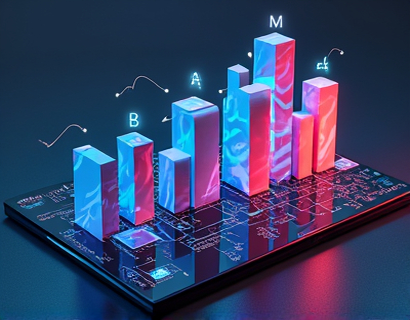Unlocking Strategic Growth: Advanced Technology Integration in Global Capital Markets Analysis
In the fast-paced and highly competitive world of global capital markets, the integration of advanced technologies has emerged as a pivotal factor for strategic growth and sustained success. Financial analysts and strategic decision-makers are increasingly turning to cutting-edge solutions to gain deeper insights, enhance operational efficiency, and make more informed decisions. This article delves into the critical role of technology integration in the analysis of global capital markets, highlighting how FinTech innovations are reshaping the industry.
The landscape of global capital markets is characterized by complexity, volatility, and an ever-increasing volume of data. Traditional methods of analysis often fall short in providing the comprehensive and real-time insights required to navigate this environment effectively. Advanced technology integration addresses these challenges by leveraging powerful tools and platforms that can process and analyze vast datasets with unprecedented speed and accuracy.
Enhanced Data Analysis and Insights
One of the most significant benefits of advanced technology integration is the enhancement of data analysis capabilities. Machine learning algorithms and artificial intelligence (AI) can sift through massive datasets to identify patterns, trends, and correlations that might go unnoticed by human analysts. These technologies enable the creation of predictive models that can forecast market movements, assess risk, and optimize investment strategies.
For instance, natural language processing (NLP) techniques can analyze news articles, social media posts, and other textual data to gauge market sentiment and identify potential impacts on asset prices. This level of granularity and depth in analysis provides a competitive edge, allowing firms to react swiftly to market changes and capitalize on emerging opportunities.
Operational Efficiency and Automation
Beyond data analysis, advanced technologies significantly improve operational efficiency in global capital markets. Automation of routine tasks such as data entry, report generation, and compliance checks reduces the risk of human error and frees up valuable time for analysts to focus on higher-value activities. Robotic process automation (RPA) and workflow automation tools are particularly effective in streamlining these processes.
Additionally, blockchain technology offers a secure and transparent way to manage transactions and maintain records. By eliminating intermediaries and reducing the potential for fraud, blockchain can lower transaction costs and enhance trust among market participants. This technology is especially relevant in areas such as trade finance, where it can simplify and accelerate the settlement process.
Risk Management and Compliance
Risk management and compliance are critical components of any capital markets strategy. Advanced technologies provide robust solutions to monitor and mitigate risks more effectively. Advanced analytics and AI-driven risk assessment tools can continuously monitor market conditions, identify potential threats, and recommend proactive measures to mitigate risks.
Compliance with regulatory requirements is another area where technology plays a vital role. RegTech solutions leverage AI and machine learning to ensure adherence to complex regulatory frameworks across different jurisdictions. These tools can automatically track changes in regulations, assess the impact on existing processes, and implement necessary adjustments, thereby reducing the risk of non-compliance and associated penalties.
Client Engagement and Personalization
The integration of advanced technologies also transforms the way firms interact with their clients. Digital platforms and mobile applications enable real-time communication, providing clients with instant access to market data, analysis, and investment insights. This level of engagement fosters stronger relationships and enhances client satisfaction.
Personalization is another key benefit. By analyzing client preferences and behavior, firms can tailor their services and product offerings to meet individual needs. This targeted approach not only improves client retention but also opens up new revenue streams through customized solutions and advisory services.
Challenges and Considerations
While the benefits of advanced technology integration are clear, firms must also be aware of the challenges and considerations involved. One of the primary concerns is the significant investment required to implement these technologies. This includes not only the initial costs of hardware and software but also the ongoing expenses related to maintenance, updates, and talent acquisition.
Another challenge is the need for a skilled workforce capable of leveraging these technologies effectively. Firms must invest in training and development programs to upskill their employees or attract talent with the necessary expertise. Additionally, ensuring data security and privacy is paramount, as the increased reliance on digital systems heightens the risk of cyber threats.
Future Trends and Innovations
Looking ahead, several emerging trends and innovations are poised to further transform the integration of technology in global capital markets analysis. Quantum computing, for example, holds the potential to revolutionize data processing capabilities, enabling even more complex and sophisticated analyses. While still in its infancy, quantum computing could significantly enhance the speed and accuracy of predictive models and risk assessments.
Another area of interest is the Internet of Things (IoT), which can provide real-time data from various sources, including sensors and devices. This data can be invaluable for monitoring market conditions, tracking supply chains, and optimizing resource allocation. The integration of IoT with existing financial systems can create a more interconnected and responsive market environment.
Furthermore, the rise of decentralized finance (DeFi) platforms is challenging traditional financial structures and opening new avenues for innovation. DeFi leverages blockchain technology to create transparent, accessible, and permissionless financial services. While still evolving, DeFi has the potential to democratize access to capital and create new opportunities for both firms and individual investors.
Conclusion
The integration of advanced technologies is not just a trend but a necessity for firms operating in the global capital markets. By embracing these innovations, financial analysts and strategic decision-makers can gain deeper insights, improve operational efficiency, enhance risk management, and deliver superior client experiences. While the journey towards full technological integration is complex and requires careful planning, the rewards in terms of strategic growth and competitive advantage are substantial. As the financial landscape continues to evolve, those who lead in technology adoption will be best positioned to thrive in the years to come.










































